The Adoption of Artificial Intelligence In Human Resource Management Practices
Updated : 4 months ago
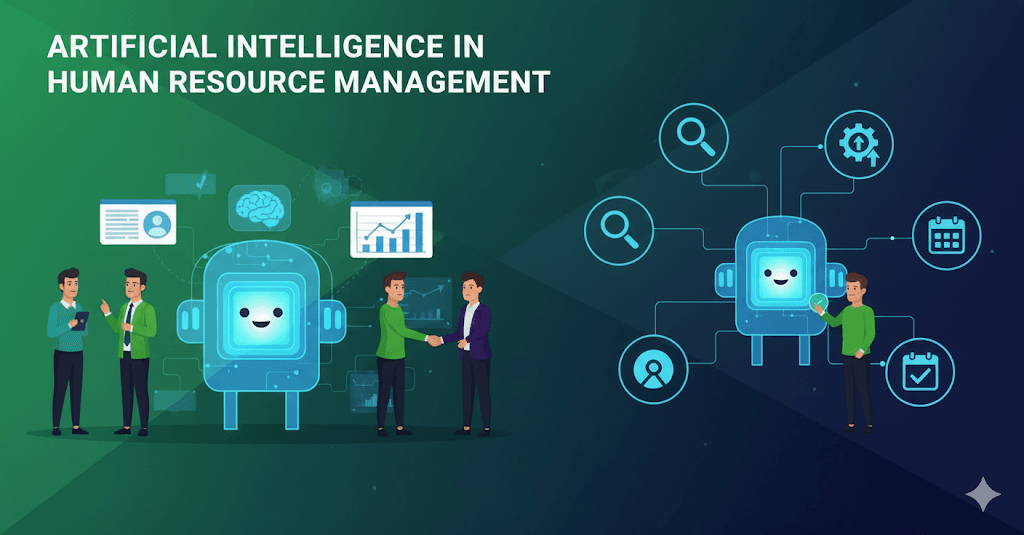 Key Takeaways
Key Takeaways
- AI adoption in HR is still low but rising fast.
- Only 3% of the businesses fully use AI in HR today.
- Over 80% of HR leaders are testing AI pilots.
- Recruitment is AI’s biggest success so far.
- Resume screening and chatbots save recruiters hours.
AI is one of the biggest digital trends of 2025, with about one-third of companies already using it in some part of their business. In HR, AI has huge potential—it can take over routine tasks, help manage the workforce more effectively, and support better decision-making.
But so far, adoption in HR is still low. Only about 3% of companies are fully using AI for HR-specific tasks. The good news is that this is changing fast.
More than 80% of HR leaders are moving from just learning about AI to actually testing it through pilot projects. With the adoption becoming a new normal, AI will help HR teams -
- save time,
- improve efficiency, and
- make smarter choices.
HR professionals need to understand both the opportunities and the challenges of AI. It includes -
- learning how to integrate AI with existing systems,
- protecting employee data, and
- addressing concerns about job security.
Today, Artificial Intelligence is no longer just a futuristic buzzword. It’s a strategic partner transforming how HR actually works. AI-powered HR transformation is enabling organizations to rethink the strategy of -
- Recruitment,
- Retention,
- Workforce, and
- The entire employee experience.
Let’s learn how AI is reshaping HR and why HR consultants and leaders need to pay attention.
What Is AI Consulting in HR?
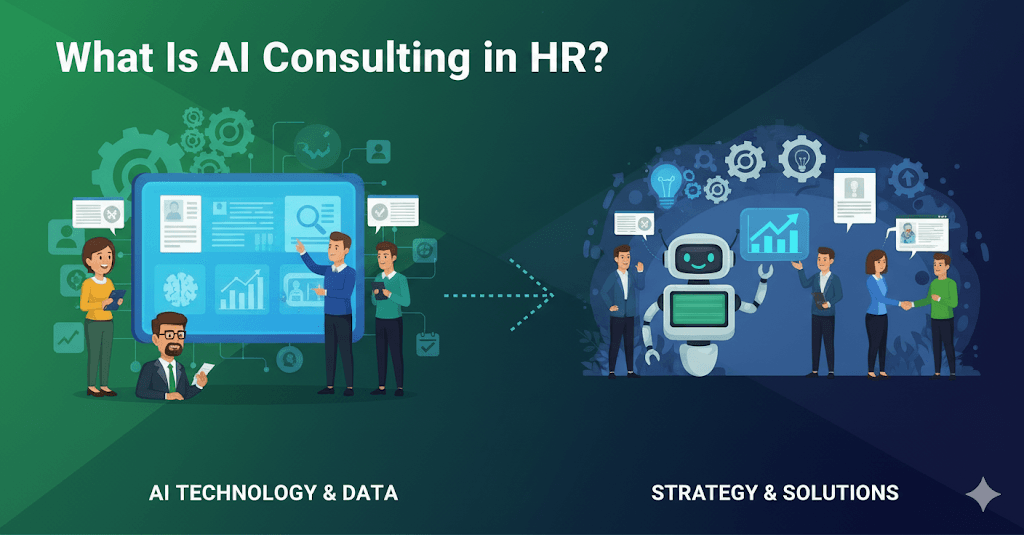 AI consulting for HR is all about using -
AI consulting for HR is all about using -
- algorithms,
- machine learning, and
- intelligent systems.
These automate tasks, get strategic insights from data, and drive some better decision-making across HR operations.
Further, these tools can range from recruitment automation to employee analytics. The aim is to make HR more efficient, fair, and human-centered.
AI consultants guide HR teams through some adoption pipelines. Those include -
- Identifying pain points,
- Designing pilot projects, and
- Benchmarking results.
What Are Some Of The Benefits Of AI Consulting For HR Leaders?
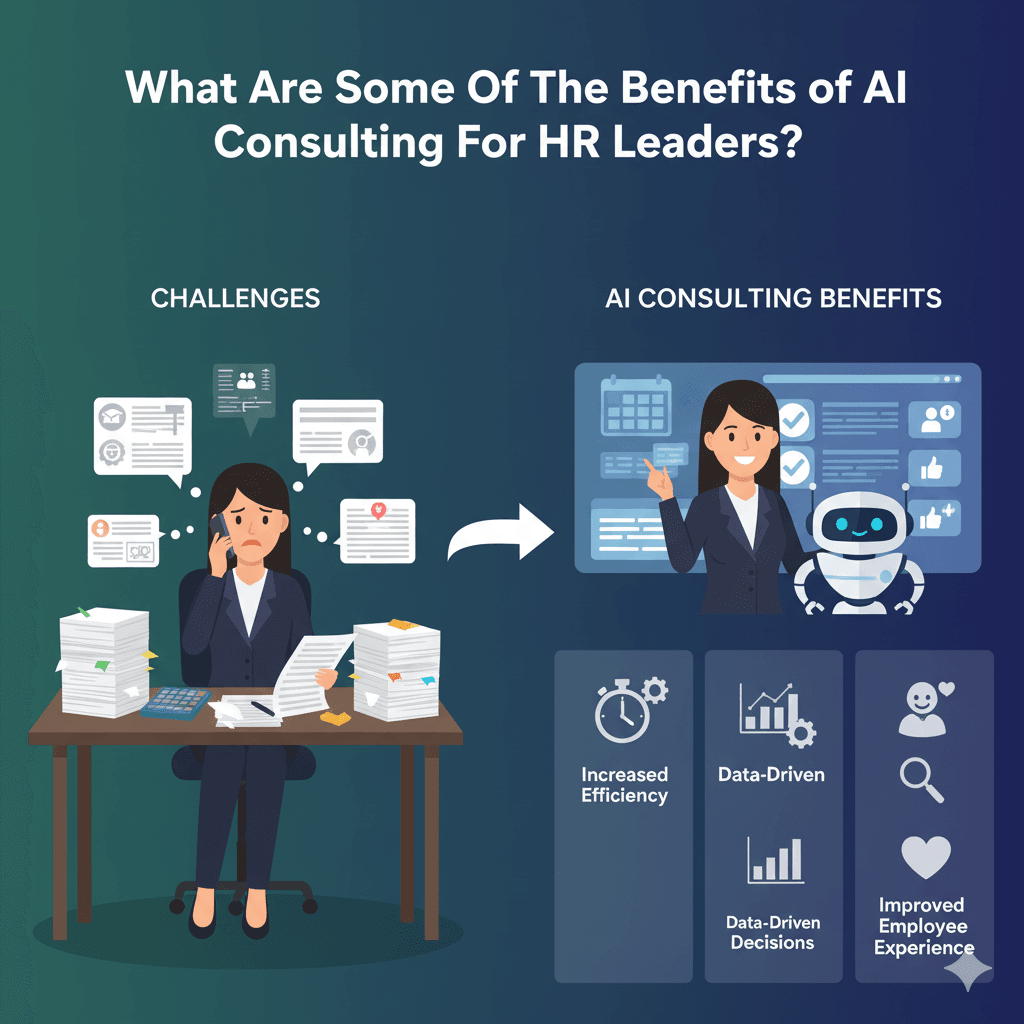
1. Better Recruitment
AI can screen resumes, schedule interviews, and assess candidate potential. It reduces recruiter workload by up to 75%. Predictive analytics identify high-fit candidates. However, it is done by -
- minimizing unconscious bias,
- improving diversity,
- equity, and
- inclusion
2. Improved Employee Onboarding
Hitachi and Texans Credit Union used AI digital assistants and automation in onboarding. It slashes the process timelines—from 10–15 days to just a few. That too with far less HR involvement. However, it significantly improved the new-hire experience.
3. Smarter Talent Retention
AI-powered HR analytics detect early warning signs of turnover. It includes -
- drops in engagement or performance changes, and
- recommends tailored interventions.
As a result, it helps retain valuable talent proactively.
4. Compensation Strategy
Companies are using AI for real-time pay benchmarking. Most tools even help design transparent compensation packages.
Human oversights are also important to prevent bias and data errors.
5. Faster Work
AI takes care of time-heavy tasks, so HR teams don’t have to. It includes -
- entering data,
- scheduling interviews, and
- screening candidates.
Smarter decisions
AI gives HR leaders useful insights. It helps them make better choices in hiring, performance reviews, and workforce planning.
Further, automating routine work reduces errors in things like -
- data entry and
- Payroll.
It makes the processes more accurate and compliant.
What Are The Key Applications of AI in HR?
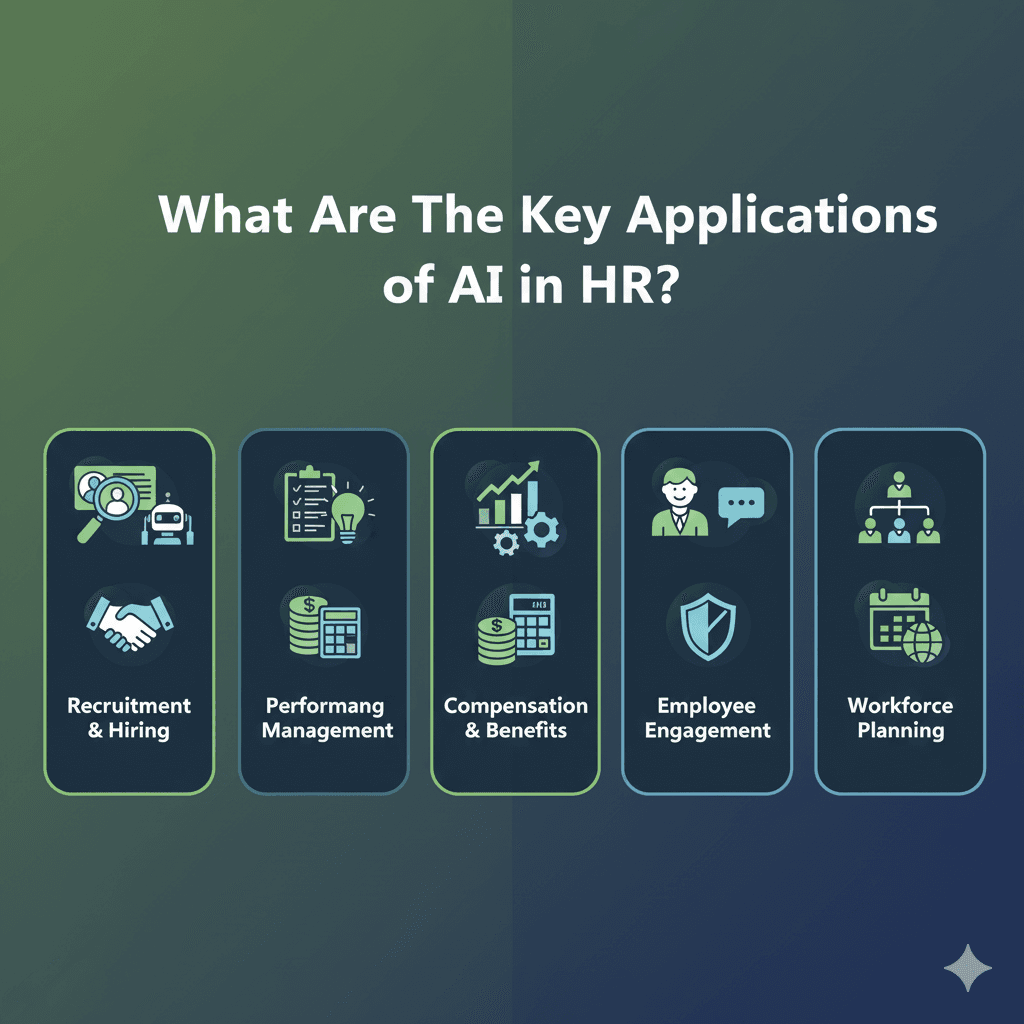
1. Recruitment & Talent Acquisition
Recruitment is one of the most time-consuming functions in HR. However, AI makes it faster and smarter.
Automated resume screening can quickly scan thousands of applications. Then, they shortlist the most relevant candidates based on -
- skills,
- experience, and
- job descriptions.
It saves recruiters countless hours.
AI chatbots also play a vital role by interacting with candidates instantly. They -
- answer common questions,
- provide updates on applications, and
- even schedule interviews.
It ensures that no candidate feels ignored during the process.
Also, predictive algorithms analyze patterns in candidate data to forecast who is most likely to succeed in a role. It needs to be done even before they apply. That allows HR teams to build strong talent pipelines proactively.
2. Employee Engagement & Experience
It is important to keep employees happy and engaged. That is just as important as hiring them. AI tools provide support by running pulse surveys. These gather real-time feedback on how employees feel about their work and workplace.
Sentiment analysis systems go one step further by monitoring employee communications, like -
- emails,
- chat platforms, or
- survey responses.
These spot trends in morale or dissatisfaction. It helps HR detect issues before they escalate.
AI can also personalize engagement strategies.
| For example, it can suggest - recognition programs, team activities, or well-being initiatives. These are tailored to individual employee preferences. It makes people feel more valued and motivated. |
3. Performance Management
Performance reviews are often criticized for being biased and inconsistent. AI solves the problem by continuously tracking performance data like -
- project outcomes,
- KPIs, or
- peer feedback
It is done by turning these into actionable insights.
Managers can then look for the top performers more accurately. It also provides support to employees who may be struggling. The reason is AI relies on objective data rather than personal opinions. Also, the performance reviews become fairer and more transparent.
It allows HR teams to design more effective career development plans. That helps employees reach their full potential.
4. HR Analytics & Workforce Planning
AI-powered analytics give HR teams a deeper understanding of their workforce.
| For example, predictive models can identify employees at risk of leaving the company. It allows HR to intervene with retention strategies. It is done before valuable talent walks out the door. |
Workforce planning also becomes smarter with AI. Also, AI helps HR leaders allocate the right people to the right roles at the right time. It is done by minimizing skill gaps and improving overall efficiency. And, by analyzing -
- market trends,
- skill requirements, and
- employee performance data,
5. Learning & Development (L&D)
Traditional training programs often take a “one-size-fits-all” approach. However, AI makes learning highly personalized. Adaptive learning platforms analyze -
- employee’s skills,
- career goals, and
- performance history.
After that, they recommend tailored training modules that fit their needs.
| For instance, AI can recommend courses in presentation or leadership, if an employee shows strong technical skills. However, they also have weak communication skills. It also ensures employees stay future-ready by matching them with upskilling opportunities. Those are more aligned with upcoming industry demands. |
The personalized approach not only makes learning more effective. But also keeps employees engaged in their professional growth.
How AI Powers HR (with uRecruits as Your All-in-One Solution)
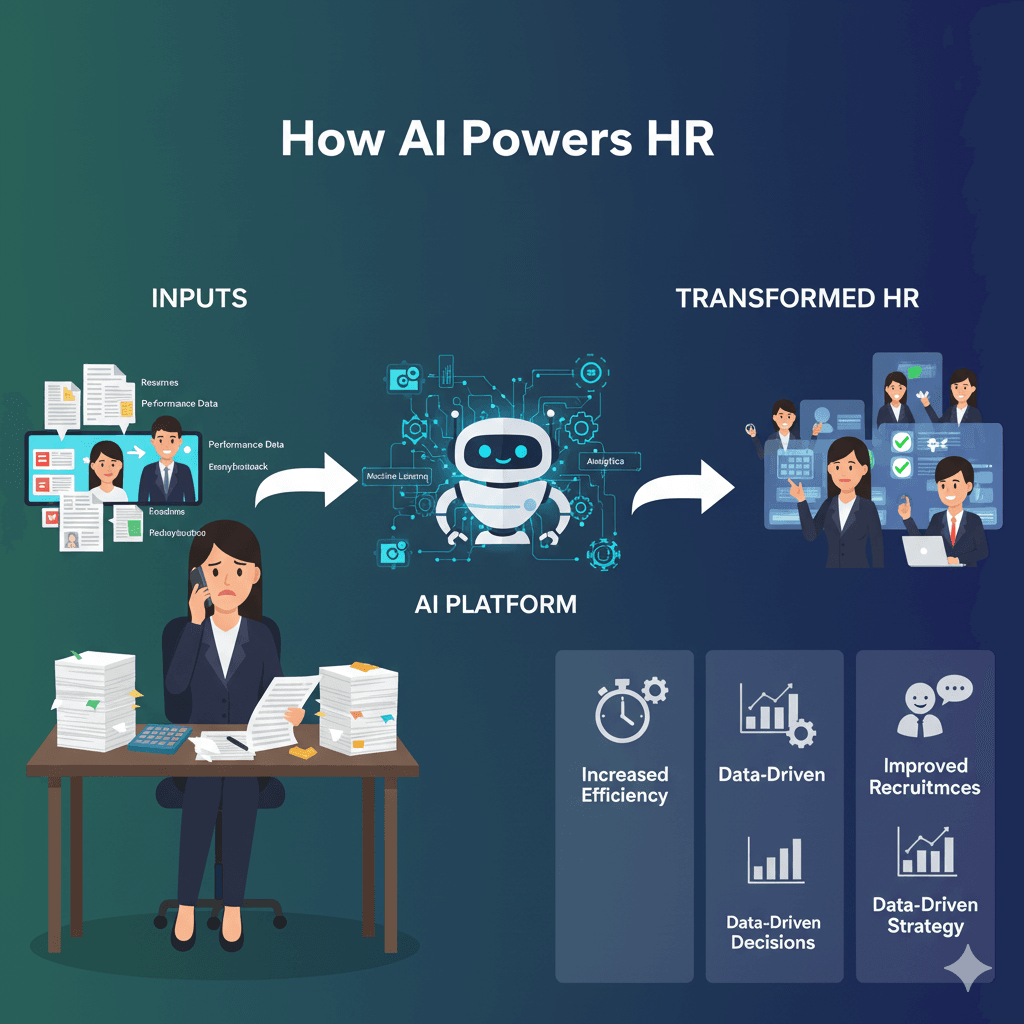 AI is changing the way HR teams work—from hiring and onboarding to employee engagement and analytics. Instead of relying on multiple disconnected platforms, uRecruits brings all the essential AI-powered HR technologies together in one place. Those are supported by expert AI consulting.
AI is changing the way HR teams work—from hiring and onboarding to employee engagement and analytics. Instead of relying on multiple disconnected platforms, uRecruits brings all the essential AI-powered HR technologies together in one place. Those are supported by expert AI consulting.
uRecruits
What it does: uRecruits is a smart, all-in-one HR tool. It uses AI to handle hiring, tests, candidate screening, analytics, and more.
How it helps in HR:
-
It cuts down manual work by automatically handling many admin tasks.
-
It gives deeper insights about candidates’ skills and personalities so you can choose people who are a better fit.
-
Helps with onboarding, employee experience, and tracking HR analytics to see how things are going.
-
Makes HR smoother and faster, so teams spend less time on paperwork and more time on people.
Case studies for HR AI consulting success
a) Hitachi & Texans Credit Union — Onboarding Revolution
Hitachi cut onboarding from 10–15 days to 4 days, and reduced HR hours per hire from 20 to 12. It is done by developing a custom AI assistant trained on documents.
b) Eightfold & AI Interviewers
Eightfold’s AI platform automates recruitment, retention, and succession planning. It handles an estimated 50% of HR tasks today. As a result, it moves toward 80% in the near future.
c) Employment Hero & SMEs — Workforce Planning AI
Startups and small businesses leverage platforms like Employment Hero to predict -
- staffing needs,
- optimize hiring, and
- benchmark compensation—on par with what larger firms use.
What Are Some Of The Key Considerations and Ethical Pitfalls?
AI isn’t about replacing HR. It’s about augmenting it. Human consultants bring -
- empathy,
- change management, and
- cultural alignment.
These are the elements that AI alone can’t replicate. Here are some key considerations.
Bias & Fairness
AI can both mitigate and perpetuate bias. Recruitment algorithms may embed historic prejudices. So, consultants must -
- audit for fairness,
- apply mitigation frameworks, and
- measure bias continuously.
Employee Well-Being & Trust
AI’s impact on job security and transparency directly affects employee morale. HR must -
- communicate openly,
- involve staff in adoption, and
- embed upskilling to mitigate fear and build confidence.
Maintaining Human Oversight
AI can automate routine tasks, sensitive decisions, like -
- termination,
- promotions,
- conflict resolution.
It still demands human empathy and judgment.
What’s Next in AI in workforce strategy?
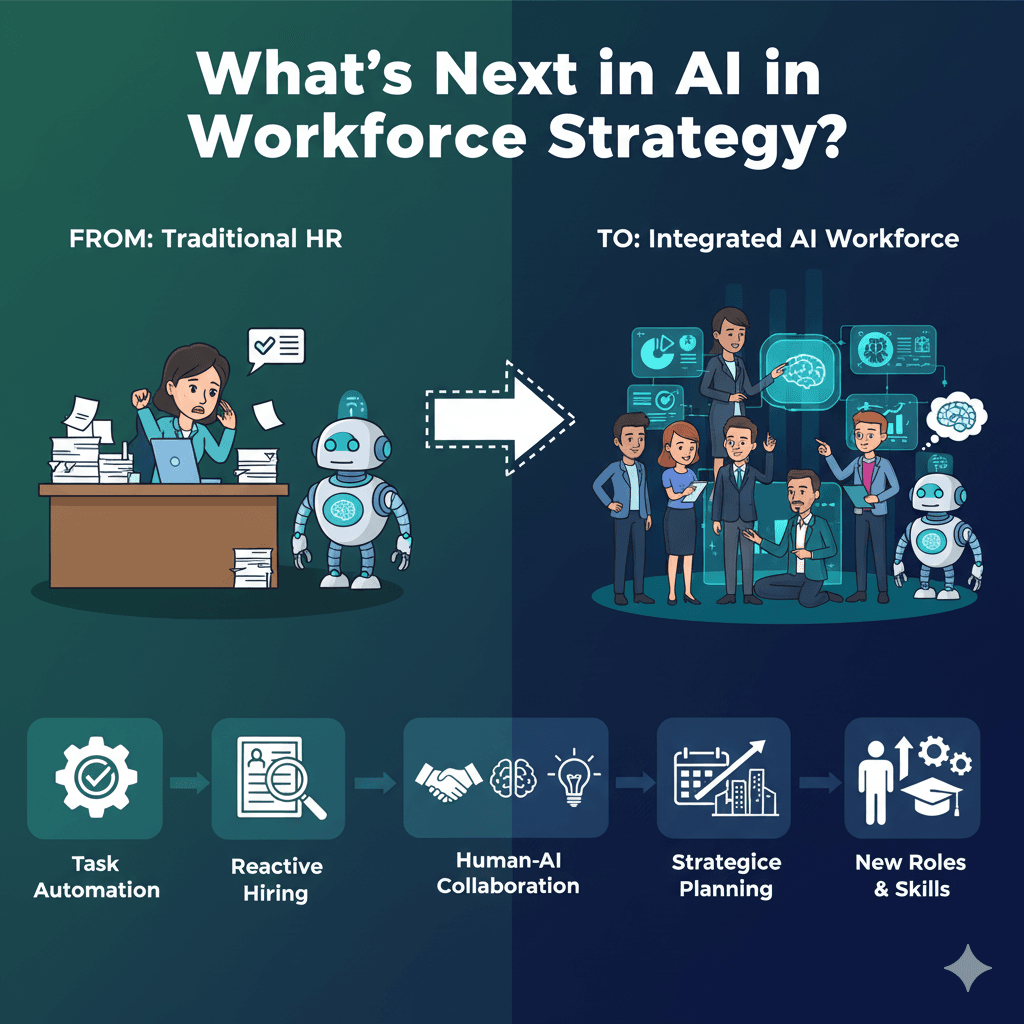 HR leaders need to do the following to scale AI adoption that too responsibly -
HR leaders need to do the following to scale AI adoption that too responsibly -
-
Establish an AI Center of Excellence (COE). It is done to steer strategy, pilot initiatives, and demonstrate ROI.
-
Introduce new roles. It includes HR technologies, AI product owners, and innovation leaders to bridge technology and human experience.
-
Upskill HR teams in literacy and build frameworks. It can be done for ethical rollout and workforce transition.
How Leaders Can Get Ready for AI in HR?
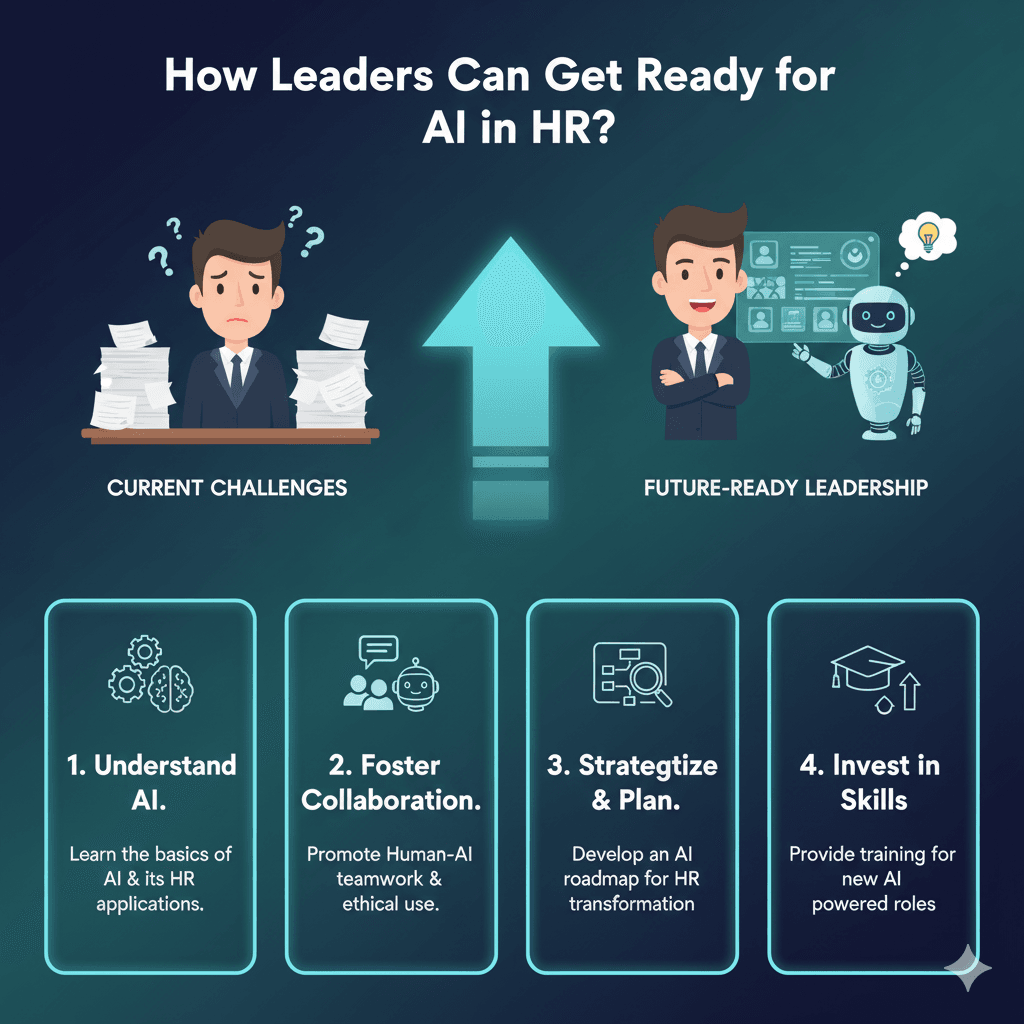 Bringing AI into HR isn’t just about using new tools. It’s about doing it strategically so it actually helps the company in the long run. Here are some practical steps HR leaders can take:
Bringing AI into HR isn’t just about using new tools. It’s about doing it strategically so it actually helps the company in the long run. Here are some practical steps HR leaders can take:
Review current HR practices
Start by looking at what your team does today. Identify tasks that are slow, repetitive, or heavy on data. Those include recruitment, onboarding, or tracking engagement. And, AI could make them faster and easier.
Focus on high-impact areas
Pick the HR areas where AI can be used to create the biggest improvements. For example, AI can speed up hiring or use predictive analytics. It improves workforce planning. Also, it ensures time and resources are used wisely.
Choose the right tools.
Select AI solutions. These not only solve HR challenges but also support the company’s overall goals and values. The tools should fit into your larger business strategy, not just HR.
Protect data and privacy.
Since AI depends on data. You need to set up clear rules for how employee information is stored, shared, and protected. Think about working with IT and legal teams to make sure privacy regulations are followed.
Train your team.
Make sure the HR team has the knowledge and confidence to use AI tools effectively. Train them. Make sure the training should cover how to use the tools, read the data, and understand what AI can and cannot do.
Balance AI with human judgment.
Define where humans need to step in. For example, let AI do the screening. However, keep final hiring or performance evaluations in human hands. It ensures fairness and ethical decision-making.
Track progress and adjust.
Keep checking if AI is delivering the results you expected. Gather the needed feedback from HR and employees. Be ready to fine-tune the process.
Finally…
AI is reshaping HR. It’s creating workplaces that are more efficient, data-driven, and people-focused. As technology advances, HR leaders will have more chances to boost employee engagement. It supports well-being and helps people grow in their careers.
But transformation is never simple. Studies show that nearly 9 out of 10 digital and AI transformation efforts fail because of the complexity involved. The key to success lies in approaching change thoughtfully. You need to build strategies that balance technology with human needs. However, there is a need to focus on long-term value, and creating a culture where people feel supported through the change.
Frequently Asked Questions
How is AI currently used in HR?
AI is mainly used for -
- recruitment (resume screening, chatbots),
- employee engagement (pulse surveys, sentiment analysis),
- performance management (data-driven reviews),
- workforce planning (predicting turnover, role allocation), and
- learning & development (personalized training).
Will AI replace HR professionals?
No. AI automates repetitive and data-heavy tasks. However, the human side of HR cannot be replaced. AI works best as a support tool, not a replacement.
What are the biggest benefits of using AI in HR?
The biggest benefits include -
- saving time,
- reducing bias,
- improving decision-making,
- increasing employee satisfaction, and
- providing predictive insights for better workforce planning.
What are the risks of AI in HR?
If AI is not implemented transparently, the main risks are -
- data privacy concerns,
- over-reliance on automation,
- potential bias in algorithms, and
- lack of employee trust.
How can small or mid-sized businesses adopt AI in HR?
Smaller companies can start with affordable AI tools integrated into -
- Applicant Tracking Systems (ATS),
- HR analytics software, or
- chatbot solutions before scaling to more advanced platforms.

